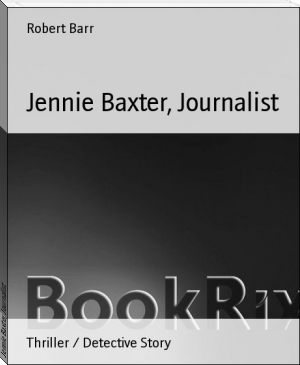Jennie Baxter, Journalist - Robert Barr (novels in english .TXT) 📗

- Author: Robert Barr
Book online «Jennie Baxter, Journalist - Robert Barr (novels in english .TXT) 📗». Author Robert Barr
not," said the young man hurriedly.
"I would rather not, but it must be told," answered the girl.
The story lasted a long time, and when it was ended the young man cried enthusiastically in answer to her question,--
"Blame you? Why, of course I don't blame you in the slightest. It wasn't Hardwick who sent you here at all, but Providence. Providence brought us together, Jennie, and my belief in it hereafter will be unshaken."
Jennie laughed a contented little laugh, and said she was flattered at being considered an envoy of Providence.
"It is only another way of saying you are an angel, Jennie," remarked the bold young man.
They crossed the frontier without interference, and, once in Germany, Jennie took the object of so much contention and placed it in the hands of her lover.
"There," she whispered, with a tiny sigh, for she was giving up the fruits of her greatest achievement, "put that in your despatch box, and see that it doesn't leave that receptacle until you reach London. I hope the Russians will like the copy of the _Daily Bugle_ they find in their envelope."
The two chatted together throughout the long ride to Berlin, and when 11 p.m. and the Schleischer station came at last, they still seemed only to have begun their conversation, so much more remained to be told.
The telegram from the Princess was handed to Lord Donal at Berlin.
"I congratulate you most sincerely," she wired; "and tell Jennie the next time you see her"--Lord Donal laughed as he read this aloud--"that the Austrian Government has awarded her thirty thousand pounds for her share in enabling them to recover their gold, and little enough I think it is, considering what she has done."
"Now, I call that downright handsome of the Austrian Government," cried Lord Donal. "I thought they were going to fight us when I read the speech of their Prime Minister, but, instead of that, they are making wedding presents to our nice girls."
"Ah, that comes through the good-heartedness of the Princess, and the kindness of the Prince," said Jennie. "He has managed it."
"But what in the world did you do for the Austrian Government, Jennie?"
"That is a long story, Donal, and I think a most interesting one."
"Well, let us thank heaven that we have a long journey for you to tell it and me to listen."
And saying this, the unabashed, forward young man took the liberty of kissing his fair companion good-night, right there amidst all the turmoil and bustle of the Schleischer Bahnhof in Berlin.
It was early in the morning when the two met again in the restaurant car. The train had passed Cologne and was now rushing up that picturesque valley through which runs the brawling little river Vesdre. Lord Donal and Jennie had the car to themselves, and they chose a table near the centre of it and there ordered their breakfast. The situation was a most picturesque one. The broad, clear plate glass windows on each side displayed, in rapid succession, a series of landscapes well worth viewing; the densely wooded hills, the cheerful country houses, the swift roaring stream lashing itself into fleecy foam; now and then a glimpse of an old ruined castle on the heights, and, in the deep valley, here and there a water mill.
It was quite evident that Jennie had slept well, and, youth being on her side, her rest had compensated for the nightmare of the Russian journey. She was simply but very effectively dressed, and looked as fresh and pretty and cool and sweet as a snowdrop. The enchanted young man found it impossible to lure his eyes away from her, and when, with a little laugh, Jennie protested that he was missing all the fine scenery, he answered that he had something much more beautiful to look upon; whereat Jennie blushed most enticingly, smiled at him, but made no further protest. Whether it was his joy in meeting Jennie, or the result of his night's sleep, or his relief at finding that his career was not wrecked, as he had imagined, or all three together, Lord Donal seemed his old self again, and was as bright, witty, and cheerful as a boy home for the holidays. They enjoyed their breakfast with the relish that youth and a healthy appetite gives to a dainty meal well served. The rolls were brown and toothsome, the butter, in thick corrugated spirals, was of a delicious golden colour, cold and crisp. The coffee was all that coffee should be, and the waiter was silent and attentive. Russia, like an evil vision, was far behind, and the train sped through splendid scenery swiftly towards England and home.
The young man leaned back in his chair, interlaced his fingers behind his head, and gazed across at Jennie, drawing a sigh of deep satisfaction.
"Well, this _is_ jolly," he said.
"Yes," murmured Jennie, "it's very nice. I always did enjoy foreign travel, especially when it can be done in luxury; but, alas! luxury costs money, doesn't it?"
"Oh, you don't need to mind, you are rich."
"That is true; I had forgotten all about it."
"I hope, Jennie, that the fact of my travelling on a _train de luxe_ has not deluded you regarding my wealth. I should have told you that I usually travel third class when I am transporting myself in my private capacity. I am wringing this pampered elegance from the reluctant pockets of the British taxpayer. When I travel for the British Government I say, as _Pooh Bah_ said to _Koko_ in the 'Mikado,' 'Do it well, my boy,' or words to that effect."
"Indeed," laughed Jennie, "I am in a somewhat similar situation; the newspaper is paying all the expenses of this trip, but I shall insist on returning the money to the _Bugle_ now that I have failed in my mission."
"Dear me, how much more honest the newspaper business is than diplomacy! The idea of returning any money never even occurred to me. The mere suggestion freezes my young blood and makes each particular hair to stand on end like quills upon the fretful porcupine. Our motto in the service is, Get all you can, and keep all you get."
"But then, you see, your case differs from mine; you did your best to succeed, and I failed through my own choice; and thus I sit here a traitor to my paper."
"Well, Jennie," said the young man, picking up the despatch-box, which he never allowed to leave his sight, and placing it on the table, "you've only to say the word, and this contentious letter is in your possession again. Do you regret your generosity?"
"Oh, no, no, no, no, I would not have it back on any account. Even looking at the matter in the most materialistic way, success means far more to you than it does to me. As you say, I am rich, therefore I am going to give up my newspaper career. I suppose that is why women very rarely make great successes of their lives. A woman's career so often is merely of incidental interest to her; a man's career is his whole life."
"What a pity it is," mused the young man, "that one person's success usually means another person's failure. If I were the generous, whole-souled person I sometimes imagine myself to be, I should refuse to accept success at the price of your failure. You have actually succeeded, while I have actually failed. With a generosity that makes me feel small and mean, you hand over your success to me, and I selfishly accept it. But I compound with my conscience in this way. You and I are to be married; then we will be one. That one shall be heir to all the successes of each of us and shall disclaim all the failures of each. Isn't that a good idea?"
"Excellent," replied Jennie; "nevertheless, I cannot help feeling just a little sorry for poor Mr. Hardwick."
"Who is he--the editor?"
"Yes. He _did_ have such faith in me that it seems almost a pity to disappoint him."
"You mustn't trouble your mind about Hardwick. Don't think of him at all; think of me instead."
"I am afraid I do, and have done so for some time past; nevertheless, I shall get off at Liege and telegraph to him that I am not bringing the document to London."
"I will send the telegram for you when we reach there; but, if I remember rightly what you told me of his purpose, he can't be very deeply disappointed. I understood you to say that he did not intend to publish the document, even if he got it."
"That is quite true. He wished to act as the final messenger himself, and was to meet me at Charing Cross Station, secure the envelope, and take it at once to its destination."
"I must confess," said the young man, with a bewildered expression, "that I don't see the object of that. Are you sure he told you the truth?"
"Oh, yes. The object was this. It seems that there is in the Foreign Office some crusty old curmudgeon who delights in baffling Mr. Hardwick. This official--I forget his name; in fact, I don't think Mr. Hardwick told me who he was--seems to forget the _Daily Bugle_ when important items of news are to be given out, and Mr. Hardwick says that he favours one of the rival papers, and the _Bugle_ has been unable, so far, to receive anything like fair treatment from him; so Mr. Hardwick wanted to take the document to him, and thus convince him there was danger in making an enemy of the _Daily Bugle_. As I understood his project, which didn't commend itself very much to me, Hardwick had no intention of making a bargain, but simply proposed to hand over the document, and ask the Foreign Office man to give the _Bugle_ its fair share in what was going."
"Do you mean to say that the official in question is the man to whom I am to give this letter?"
"Yes."
"Oh, my prophetic soul, my uncle! Why, that is Sir James Cardiff, the elder brother of my mother; he is a dear old chap, but I can well understand an outsider thinking him gruff and uncivil. If the editor really means what he says, then there will be no difficulty and no disappointment. If all that is needed is the winning over of old Jimmy to be civil to Hardwick, I can guarantee that. I am the especial _protege_ of my uncle. Everything I know I have learned from him. He cannot understand why the British Government does not appoint me immediately Ambassador to France; Jimmy would do it to-morrow if he had the power. It was through him that I heard of this letter, and I believe his influence had a good deal to do with my getting the commission of special messenger. It was the chagrin that my uncle Jimmy would have felt, had I failed, that put the final drop of bitterness in my cup of sorrow when I came to my senses after my encounter with the Russian police. That would have been a stunning blow to Sir James Cardiff. We shall reach Charing Cross about 7.30 to-night, and Sir James will be there with his brougham to take charge of me when I arrive. Now, what do you say to our settling all this under the canopy of Charing Cross Station? If you telegraph Mr. Hardwick to meet us there, I will introduce him to Sir
"I would rather not, but it must be told," answered the girl.
The story lasted a long time, and when it was ended the young man cried enthusiastically in answer to her question,--
"Blame you? Why, of course I don't blame you in the slightest. It wasn't Hardwick who sent you here at all, but Providence. Providence brought us together, Jennie, and my belief in it hereafter will be unshaken."
Jennie laughed a contented little laugh, and said she was flattered at being considered an envoy of Providence.
"It is only another way of saying you are an angel, Jennie," remarked the bold young man.
They crossed the frontier without interference, and, once in Germany, Jennie took the object of so much contention and placed it in the hands of her lover.
"There," she whispered, with a tiny sigh, for she was giving up the fruits of her greatest achievement, "put that in your despatch box, and see that it doesn't leave that receptacle until you reach London. I hope the Russians will like the copy of the _Daily Bugle_ they find in their envelope."
The two chatted together throughout the long ride to Berlin, and when 11 p.m. and the Schleischer station came at last, they still seemed only to have begun their conversation, so much more remained to be told.
The telegram from the Princess was handed to Lord Donal at Berlin.
"I congratulate you most sincerely," she wired; "and tell Jennie the next time you see her"--Lord Donal laughed as he read this aloud--"that the Austrian Government has awarded her thirty thousand pounds for her share in enabling them to recover their gold, and little enough I think it is, considering what she has done."
"Now, I call that downright handsome of the Austrian Government," cried Lord Donal. "I thought they were going to fight us when I read the speech of their Prime Minister, but, instead of that, they are making wedding presents to our nice girls."
"Ah, that comes through the good-heartedness of the Princess, and the kindness of the Prince," said Jennie. "He has managed it."
"But what in the world did you do for the Austrian Government, Jennie?"
"That is a long story, Donal, and I think a most interesting one."
"Well, let us thank heaven that we have a long journey for you to tell it and me to listen."
And saying this, the unabashed, forward young man took the liberty of kissing his fair companion good-night, right there amidst all the turmoil and bustle of the Schleischer Bahnhof in Berlin.
It was early in the morning when the two met again in the restaurant car. The train had passed Cologne and was now rushing up that picturesque valley through which runs the brawling little river Vesdre. Lord Donal and Jennie had the car to themselves, and they chose a table near the centre of it and there ordered their breakfast. The situation was a most picturesque one. The broad, clear plate glass windows on each side displayed, in rapid succession, a series of landscapes well worth viewing; the densely wooded hills, the cheerful country houses, the swift roaring stream lashing itself into fleecy foam; now and then a glimpse of an old ruined castle on the heights, and, in the deep valley, here and there a water mill.
It was quite evident that Jennie had slept well, and, youth being on her side, her rest had compensated for the nightmare of the Russian journey. She was simply but very effectively dressed, and looked as fresh and pretty and cool and sweet as a snowdrop. The enchanted young man found it impossible to lure his eyes away from her, and when, with a little laugh, Jennie protested that he was missing all the fine scenery, he answered that he had something much more beautiful to look upon; whereat Jennie blushed most enticingly, smiled at him, but made no further protest. Whether it was his joy in meeting Jennie, or the result of his night's sleep, or his relief at finding that his career was not wrecked, as he had imagined, or all three together, Lord Donal seemed his old self again, and was as bright, witty, and cheerful as a boy home for the holidays. They enjoyed their breakfast with the relish that youth and a healthy appetite gives to a dainty meal well served. The rolls were brown and toothsome, the butter, in thick corrugated spirals, was of a delicious golden colour, cold and crisp. The coffee was all that coffee should be, and the waiter was silent and attentive. Russia, like an evil vision, was far behind, and the train sped through splendid scenery swiftly towards England and home.
The young man leaned back in his chair, interlaced his fingers behind his head, and gazed across at Jennie, drawing a sigh of deep satisfaction.
"Well, this _is_ jolly," he said.
"Yes," murmured Jennie, "it's very nice. I always did enjoy foreign travel, especially when it can be done in luxury; but, alas! luxury costs money, doesn't it?"
"Oh, you don't need to mind, you are rich."
"That is true; I had forgotten all about it."
"I hope, Jennie, that the fact of my travelling on a _train de luxe_ has not deluded you regarding my wealth. I should have told you that I usually travel third class when I am transporting myself in my private capacity. I am wringing this pampered elegance from the reluctant pockets of the British taxpayer. When I travel for the British Government I say, as _Pooh Bah_ said to _Koko_ in the 'Mikado,' 'Do it well, my boy,' or words to that effect."
"Indeed," laughed Jennie, "I am in a somewhat similar situation; the newspaper is paying all the expenses of this trip, but I shall insist on returning the money to the _Bugle_ now that I have failed in my mission."
"Dear me, how much more honest the newspaper business is than diplomacy! The idea of returning any money never even occurred to me. The mere suggestion freezes my young blood and makes each particular hair to stand on end like quills upon the fretful porcupine. Our motto in the service is, Get all you can, and keep all you get."
"But then, you see, your case differs from mine; you did your best to succeed, and I failed through my own choice; and thus I sit here a traitor to my paper."
"Well, Jennie," said the young man, picking up the despatch-box, which he never allowed to leave his sight, and placing it on the table, "you've only to say the word, and this contentious letter is in your possession again. Do you regret your generosity?"
"Oh, no, no, no, no, I would not have it back on any account. Even looking at the matter in the most materialistic way, success means far more to you than it does to me. As you say, I am rich, therefore I am going to give up my newspaper career. I suppose that is why women very rarely make great successes of their lives. A woman's career so often is merely of incidental interest to her; a man's career is his whole life."
"What a pity it is," mused the young man, "that one person's success usually means another person's failure. If I were the generous, whole-souled person I sometimes imagine myself to be, I should refuse to accept success at the price of your failure. You have actually succeeded, while I have actually failed. With a generosity that makes me feel small and mean, you hand over your success to me, and I selfishly accept it. But I compound with my conscience in this way. You and I are to be married; then we will be one. That one shall be heir to all the successes of each of us and shall disclaim all the failures of each. Isn't that a good idea?"
"Excellent," replied Jennie; "nevertheless, I cannot help feeling just a little sorry for poor Mr. Hardwick."
"Who is he--the editor?"
"Yes. He _did_ have such faith in me that it seems almost a pity to disappoint him."
"You mustn't trouble your mind about Hardwick. Don't think of him at all; think of me instead."
"I am afraid I do, and have done so for some time past; nevertheless, I shall get off at Liege and telegraph to him that I am not bringing the document to London."
"I will send the telegram for you when we reach there; but, if I remember rightly what you told me of his purpose, he can't be very deeply disappointed. I understood you to say that he did not intend to publish the document, even if he got it."
"That is quite true. He wished to act as the final messenger himself, and was to meet me at Charing Cross Station, secure the envelope, and take it at once to its destination."
"I must confess," said the young man, with a bewildered expression, "that I don't see the object of that. Are you sure he told you the truth?"
"Oh, yes. The object was this. It seems that there is in the Foreign Office some crusty old curmudgeon who delights in baffling Mr. Hardwick. This official--I forget his name; in fact, I don't think Mr. Hardwick told me who he was--seems to forget the _Daily Bugle_ when important items of news are to be given out, and Mr. Hardwick says that he favours one of the rival papers, and the _Bugle_ has been unable, so far, to receive anything like fair treatment from him; so Mr. Hardwick wanted to take the document to him, and thus convince him there was danger in making an enemy of the _Daily Bugle_. As I understood his project, which didn't commend itself very much to me, Hardwick had no intention of making a bargain, but simply proposed to hand over the document, and ask the Foreign Office man to give the _Bugle_ its fair share in what was going."
"Do you mean to say that the official in question is the man to whom I am to give this letter?"
"Yes."
"Oh, my prophetic soul, my uncle! Why, that is Sir James Cardiff, the elder brother of my mother; he is a dear old chap, but I can well understand an outsider thinking him gruff and uncivil. If the editor really means what he says, then there will be no difficulty and no disappointment. If all that is needed is the winning over of old Jimmy to be civil to Hardwick, I can guarantee that. I am the especial _protege_ of my uncle. Everything I know I have learned from him. He cannot understand why the British Government does not appoint me immediately Ambassador to France; Jimmy would do it to-morrow if he had the power. It was through him that I heard of this letter, and I believe his influence had a good deal to do with my getting the commission of special messenger. It was the chagrin that my uncle Jimmy would have felt, had I failed, that put the final drop of bitterness in my cup of sorrow when I came to my senses after my encounter with the Russian police. That would have been a stunning blow to Sir James Cardiff. We shall reach Charing Cross about 7.30 to-night, and Sir James will be there with his brougham to take charge of me when I arrive. Now, what do you say to our settling all this under the canopy of Charing Cross Station? If you telegraph Mr. Hardwick to meet us there, I will introduce him to Sir
Free e-book «Jennie Baxter, Journalist - Robert Barr (novels in english .TXT) 📗» - read online now
Similar e-books:





Comments (0)